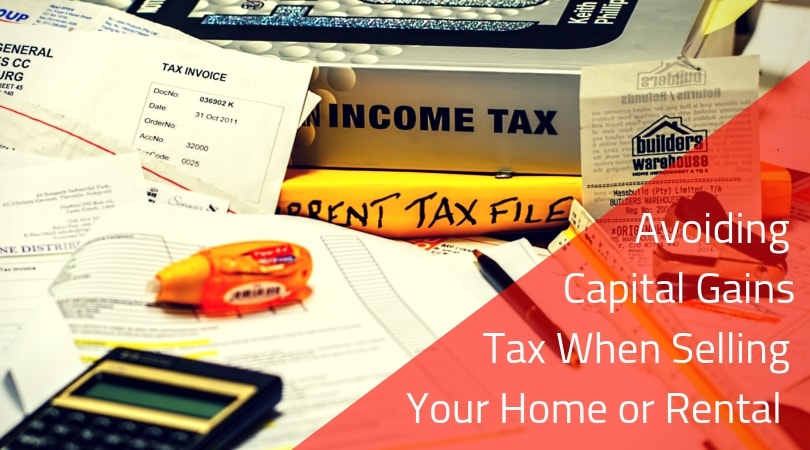When we’re selling our properties, one of our first concerns is naturally taxation. In all of our business and investment ventures, we achieve the greatest returns when taxes are kept to a minimum.
You are most likely already familiar with the concept, but capital gains are a special type of tax that are levied against property owners who are selling. Unless certain exemptions apply, the tax will be assessed on the cash proceeds of the sale.
Fortunately, there are a number of strategies that can help you avoid paying all that tax. Keep reading to learn some essential ways to get around capital gains tax.
Owner Occupied
If you just moved, you’re probably not looking to sell right away, but if you decide in the first two years that you want out you’ll be faced with the capital gains liability, if you make a profit on the sale. If you’ve been living in your property for at least two out of the last 5 years, you may qualify for an exemption from capital gains tax on the sales price in the amount of $250K for individuals, and $500K for couples.
The way to avoid capital gains taxes in general is deferring the income of the sale to future years, that way you only pay a small amount on the revenue you generate each year. The related benefit is that it keeps your total income in a lower tax bracket. If you were to take all cash in the year of the sale, with no exemptions, it would push you into a higher tax rate. If you haven’t lived in the property for two years, there are still other options to avoid paying capital gains tax.
Rental Properties
Owning rental properties is like owning a business. There are certain expenses you expect to pay in the course of business. Our least favorite is capital gains when it’s time to make some profit after our long value-building efforts. If your property is a rental and you haven’t lived in it for at least two out of the last five years, you’ll likely be paying up to a 25% tax on the proceeds.
This one of the things that makes ‘house hacking’ a great strategy. House hacking is when you buy a multifamily rental property and live in one of the units. This offsets your personal mortgage or rental expense and can allow you to avoid paying capital gains tax when you pursue your exit strategy. Since our goal with our rental it to make the most money as possible (the bottom line), we have to balance the cost of taxes with the utility of cash. Depending on your needs, transactions can be structured to involve seller financing and cash, a balance of which provides the money needed for personal or professional objectives and shelter from increased tax liability.
Lease Option
Rather than selling your property outright, there’s another option: the lease option. Lease options are simple agreements that allow an optionee to make you payments (regular cash flow ? ?), with a portion going to the down payment or principal. After a specified period of time, often 2-5 years, the buyer (optionee) has the right to purchase the property at a predetermined/index price.
This is attractive to many buyers, especially those that aren’t in the position to buy a house conventionally, as often there are minimal credit and down payment (lease consideration due upfront) requirements associated with lease options. It’s also relatively low risk. If the optionee defaults or chooses not to exercise the option, the optionor (owner) has the right to retain the lease consideration and re-lease to a new optionee. This is a profitable short-term solution to defer taxes and continue generating income.
Extending Financing
Another great option that many sellers prefer to avoid capital gains tax is seller financing.
Why give a loan to the buyer? Why would I want to go and do that?
Cash flow, no management responsibility, protection from liability, and deferral of income to decrease your upcoming tax liability.
You might have heard of a triple-net or NNN lease. This is a type of commercial lease that passes all the operational costs and management duties of the property to the tenant. This is a low risk situation for the investor that provides stable positive cash flow that doesn’t fluctuate as the cost of maintenance and other variable costs increase over the term of the lease. What’s my point?
Seller financing offers property owners the same benefits. You continue to earn a strong return rate (of your choice), while eliminating all your management responsibilities, liability, and diminishing your tax liability. As we’re not CPAs or attorneys, please consult the appropriate professionals before making any investment decision regarding your home or rental.
Waiting for the Right Time
If all else fails and the other strategies mentioned here don’t work for your situation, it may simply be best to wait for the right time to sell. If this is the case, it’s sensible to have a plan to prepare for when you are ready to sell. Take stock of the condition of your home or rental and determine what repairs are needed to get the best market value. If your financial, legal or personal situation poses current barriers to the sale of your property, there are other ways to improve the net income or value of the property. A proactive approach will make your sale faster and more profitable if you start planning properly now.
Call us at (617) 250-7100 or click here to discuss an array of potential solutions to help you achieve your homeownership goals.



